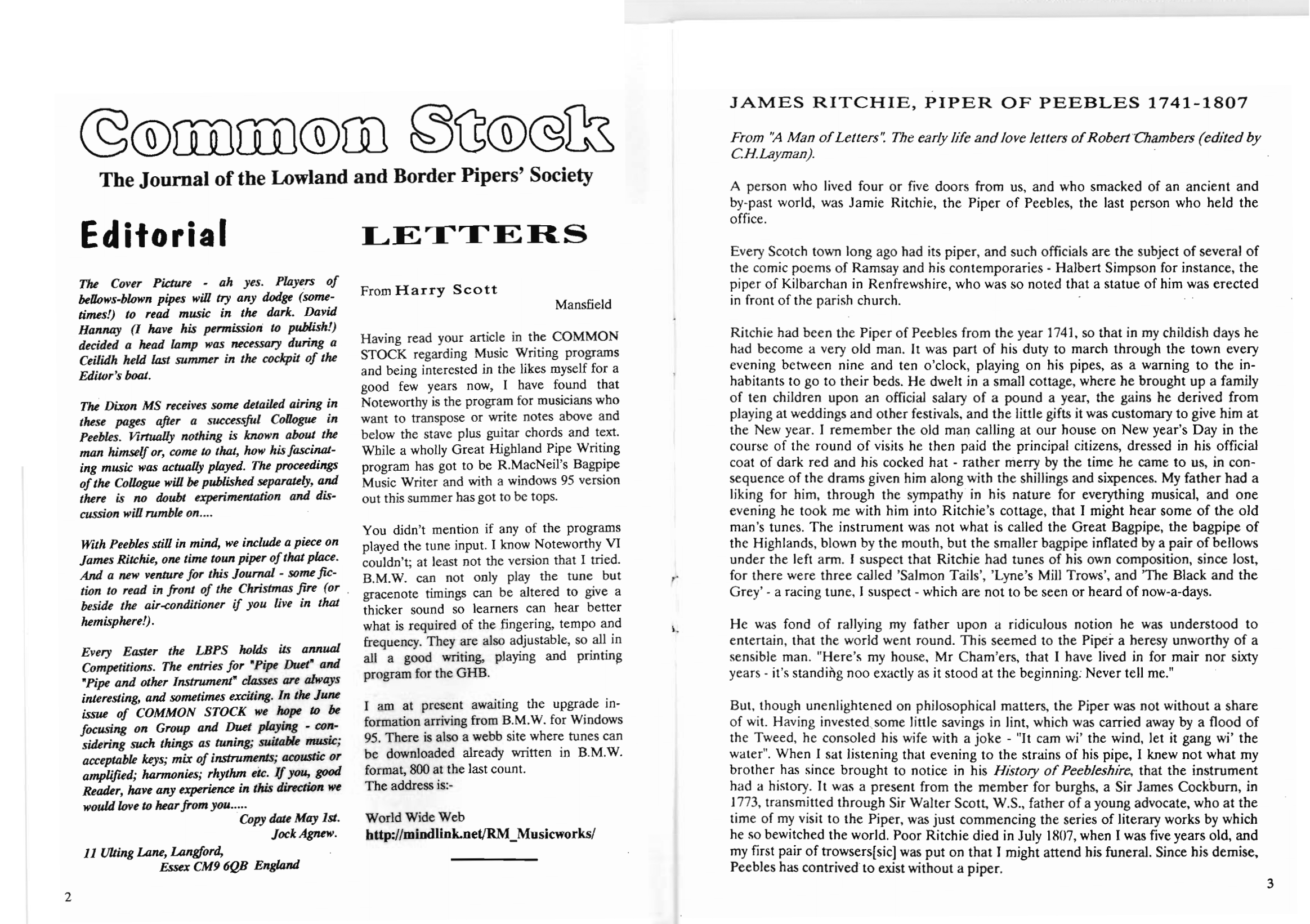JAMES RITCHIE, PIPER OF PEEBLES 1741-1807

From “A Man of Letters”. The early life and love letters of Robert Chambers (edited by CH. Layman).
A person who lived four or five doors from us, and who smacked of an ancient and by-past world, was Jamie Ritchie, the Piper of Peebles, the last person who held the office. Every Scotch town long ago had its piper, and such officials are the subject of several of the comic poems of Ramsay and his contemporaries - Halbert Simpson for instance, the piper of Kilbarchan in Renfrewshire, who was so noted that a statue of him was erected in front of the parish church.
Ritchie had been the Piper of Peebles from the year 1741, so that in my childish days he had become a very old man, It was part of his duty to march through the town every evening between nine and ten o’clock, playing on his pipes, as a warning to the inhabitants to go to their beds. He dwelt in a small cottage, where he brought up a family of ten children upon an official salary of a pound a year, the gains he derived from playing at weddings and other festivals, and the little gifts it was customary to give him at the New year. I remember the old man calling at our house on New year’s Day in the course of the round of visits he then paid the principal citizens, dressed in his official coat of dark red and his cocked hat - rather merry by the time he came to us, in consequence of the drams given him along with the shillings and sixpences. My father had a liking for him, through the sympathy in his nature for everything musical, and one evening he took me with him into Ritchie’s cottage, that I might hear some of the old man’s tunes. The instrument was not what is called the Great Bagpipe, the bagpipe of the Highlands, blown by the mouth, but the smaller bagpipe inflated by a pair of bellows under the left arm. I suspect that Ritchie had tunes of his own composition, since lost, for there were three called ‘Salmon Tails’, ‘Lyne’s Mill Trows’, and ‘The Black and the Grey’ - a racing tune, I suspect - which are not to be seen or heard of now-a-days.
He was fond of rallying my father upon a ridiculous notion he was understood to entertain, that the world went round. This seemed to the Piper a heresy unworthy of a sensible man. “Here’s my house, Mr Cham’ers, that I have lived in for mair nor sixty years - it’s standing noo exactly as it stood at the beginning: Never tell me.” But, though unenlightened on philosophical matters, the Piper was not without a share of wit. Having invested. some little savings in lint, which was carried away by a flood of the Tweed, he consoled his wife with a joke - “It cam wi’ the wind, let it gang wi’ the water”, When I sat listening that evening to the strains of his pipe, I knew not what my brother has since brought to notice in his History of Peebleshire, that the instrument had a history. It was a present from the member for burghs, a Sir James Cockburn, in 1773, transmitted through Sir Walter Scott, W.S., father of a young advocate, who at the time of my visit to the Piper, was just commencing the series of literary works by which he so bewitched the world. Poor Ritchie died in July 1807, when I was five years old, and my first pair of trowsers[sic] was put on that I might attend his funeral. Since his demise, Peebles has contrived to exist without a piper.
